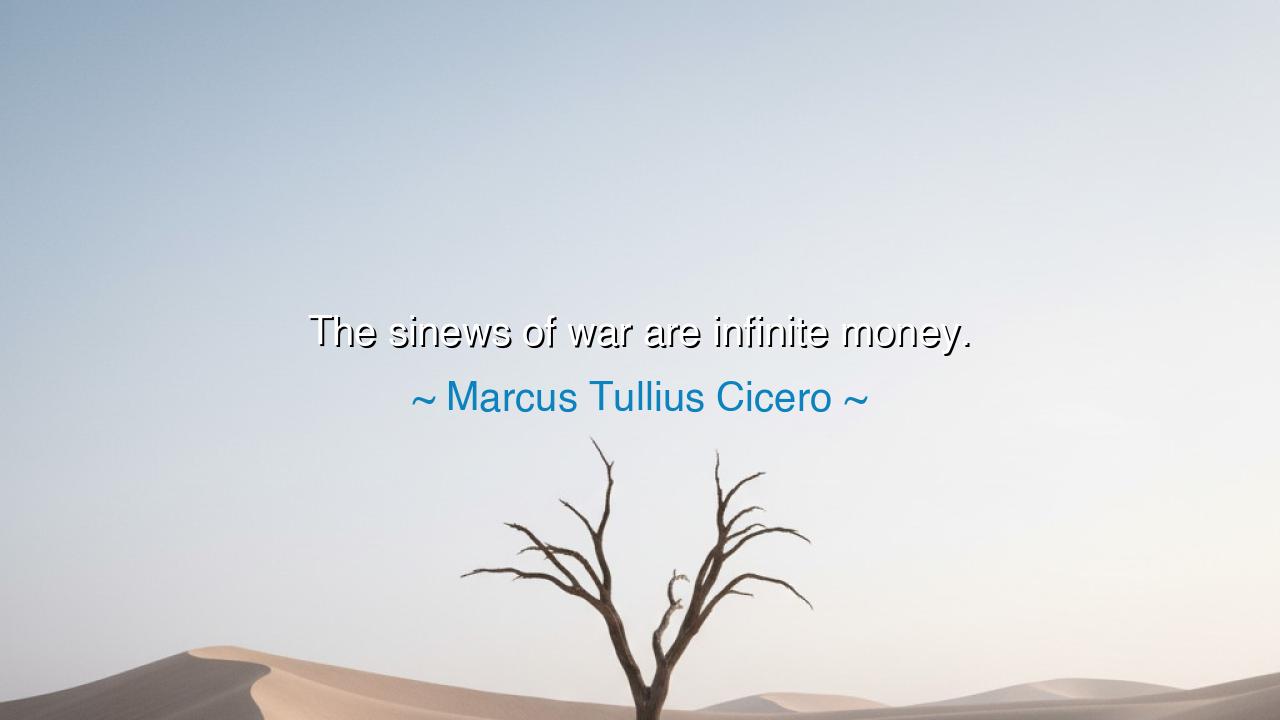
The sinews of war are infinite money.






Hear the words of Marcus Tullius Cicero, that ancient guardian of Rome’s tongue and mind: “The sinews of war are infinite money.” He speaks not of glory, nor of valor, but of the hidden marrow that gives armies strength. Just as the body cannot move without sinew, so too the engines of war cannot move without the power of wealth. This truth, though spoken centuries ago, remains eternal: the sword may strike, the shield may block, but behind both stand the coffers that make them possible.
Cicero lived in an age when Rome trembled between republic and empire, when generals like Caesar and Pompey raised vast legions not only by loyalty, but by gold. Soldiers, though brave, could not march long without pay. Horses required fodder, fleets required timber, cities required grain. War was not waged by courage alone, but by the endless stream of coin that turned iron into power. Thus Cicero unveiled a harsh truth: without money, war falters, and with it, even the mightiest nation may crumble.
This wisdom was proven in the Punic Wars against Carthage. Though Rome’s citizens were fierce and disciplined, their greatest enemy was a city of merchants, swollen with trade and wealth. Hannibal crossed the Alps with elephants, but behind his daring stood the treasury of Carthage. For years Rome bled, until it too summoned its resources, taxing its people, calling upon allies, and pouring money into fleets that finally broke the power of its rival. It was not simply the clash of arms, but the endurance of financial sinew that determined the victor.
Consider also the wars of more recent times. In the Second World War, the armies of Hitler marched swiftly, fueled by plunder and industry. Yet in the end, it was the vast wealth of the United States — its factories, its steel, its inexhaustible supplies — that tipped the balance. Bombers and tanks rolled forth in such number that the tide of battle could not be resisted. Courage was everywhere, but without the river of resources, even the bravest soldier would have stood defenseless. Cicero’s truth, once again, revealed itself across the ages.
Yet let us not hear these words as a hymn to money itself, for Cicero was no worshipper of gold. Rather, his words carry warning: that war feeds endlessly on wealth, draining nations until they wither. He teaches us that to choose war is to choose a path where the hunger for resources never ends. Armies consume coin as fire consumes wood. And when the treasury empties, it is the people who suffer, taxed into poverty, their labor devoured by the insatiable demands of conflict.
From this, we draw a lesson for all ages: guard well your resources, for they are the strength of your endeavors, whether in peace or in struggle. Do not squander them in vain pursuits, for every choice has its cost. A family that wastes its wealth will find itself powerless in crisis; a nation that bleeds its treasury for endless battles will find itself hollow, vulnerable to decay. Cicero’s teaching is not only for generals but for all who would build a life of endurance and strength.
Therefore, my children, learn to wield money as you would wield a sword — with discipline, with purpose, and never for vanity. Let it be the servant of justice, not the master of ambition. In times of peace, nurture it wisely; in times of trial, spend it with vision. And above all, remember that the truest sinews of any people are not only their coin but their unity, their wisdom, and their resolve. For though gold may arm the soldier, it is the spirit of the people that wins the day.






TNThanh Truc Nguyen
It’s hard to ignore the fact that Cicero’s quote still resonates today. Wars require immense financial resources, and often, the true cost of war is hidden in the economic systems that sustain it. How do you think we can reform these systems to make war less profitable and encourage peaceful solutions instead?
TDThuy Dao
Cicero’s perspective seems to imply that war is ultimately a financial enterprise. This view makes me wonder, do modern conflicts still revolve around economic gains as much as they do political or ideological motives? How much of today’s global conflict is driven by the same forces Cicero was warning about?
PLTran Nguyen Phuong Linh
This quote by Cicero raises an uncomfortable truth: wars often aren’t just about ideology or revenge, but about resources. How do you think the pursuit of wealth affects the decision-making process in war? Are there instances where wars could have been avoided if the financial interests of those involved had been less prominent?
UGUser Google
Cicero’s quote suggests that war, at its core, is fueled by money. It’s a sobering thought—how much of the devastation of war is driven by the pursuit of wealth, resources, and power? What do you think about this idea? Can we ever truly end war if the financial incentives remain so strong?